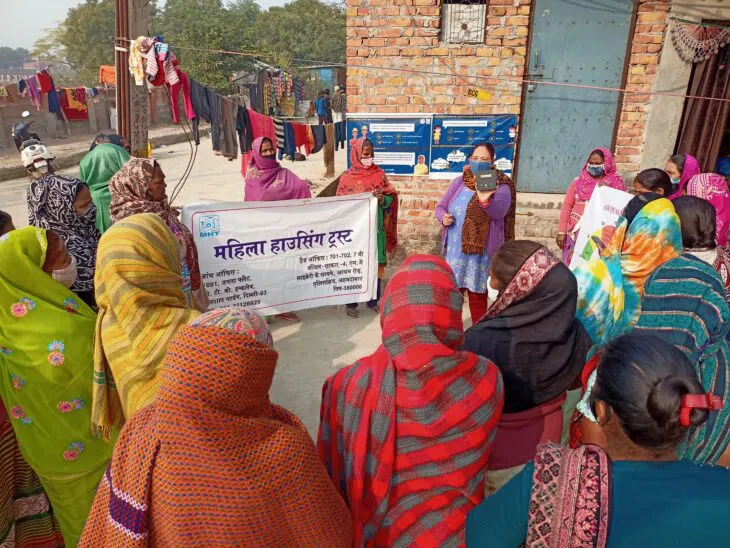
EXPLANATION: Women, working as AQI ambassadors, explaining the AQI index
Wearing a mask and holding a mini Air Quality Index (AQI) monitor in her hand, Laxmi Devi leaves for a visit to her community members, mostly women, to apprise them of the increasing air pollution and its impact.
“Many women in my community are heavily exposed to severe air pollution. Most of them live in cramped houses with almost no ventilation. Some of them work as construction labourers even in this severe air pollution,” she explains while leaving for the community meeting.
Laxmi, a 30-year-old resident of Bakkarwala Colony located in west Delhi’s Mundka, is an ‘AQI Ambassador’ with Mahila Housing Trust (MHT), a women-led NGO.
MHT works with communities and construction workers from across the resettlement colonies of Bakkarwala, Gokulpuri, and Sawda Ghevra in Delhi to create awareness of air pollution as a health problem.
The women meet in the nearby community centre.
Many women in Bakkarwala community work in the construction industry, where they are exposed to dust, sand, and cement, making them vulnerable to pollution.
“AQI ambassadors” like Laxmi teach workers how to measure air pollution using the monitor and what severe pollution means for their health.
She convened the meeting by recording AQI which, on this day, was above 400.
“I work as a construction labourer. It gets difficult to work during winters because of the high pollution. The site already has lots of dust and Delhi’s winter pollution makes it worse,” says Usha Kushwala, a construction worker when asked about her working condition.
We have come here to understand how it can impact us and how can we keep ourselves safe from it, she adds.
Construction is the second largest sector by employment in India after agriculture, with 49% of the industry’s workers being women.
Ninety-four per cent of female construction workers avoid talking about air pollution out of fear of losing their job, says a 2022 study by MHT on women construction workers and Delhi’s air pollution.
Laxmi is not the only AQI ambassador. MHT has trained more than 75 female construction workers to develop a scientific understanding of air pollution and its causes.
“The idea is to train women from the community to become master trainers or AQI ambassadors. These women raise awareness among construction workers and other community members on the severe repercussions of air pollution on their health,” explains Veena Bhardwaj, Programme Manager at MHT.
Though everyone can find the AQI level from the news, these ambassadors check AQI on the spot and explain simple ways for protection, she adds.
Adverse impact on health is not the only consequence of severe air pollution. Ban on construction to control pollution also leaves these construction workers without work for weeks.
“Despite pollution, we try to work with a mask or a handkerchief. But for the past few years, the government has put a ban on construction activities at this time of the year. So, we end up just sitting at home without work,” adds Usha.
MHT has engaged with local government and other key stakeholders to encourage a shift in policy, Veena adds.
Over 470 construction workers were supported by MHT to access financial compensation of Rs 5,000 from the Delhi government due to ban on construction. However, social security schemes are very few and can’t be accessed by everybody.
(This story was produced with support from Narender Revelli National Media Fellowships 2023.)
Unidentified motorcycle-borne assailants fired at a Farsh Bazar house in the early hours; no injuries…
Delhi, placed in Pool H, recorded a commanding 64-42 victory over Tripura. Ashish led from…
Court grants bail to six accused on Rs 50,000 bonds each, noting unclear video identification,…
Her government is working continuously to fulfil the resolve of building a 'Viksit Delhi,' and…
Delhi govt asks hotels, clubs and restaurants to renew licences under existing excise policy for…
Skill scheme for Khadi workers to support 16,000 artisans with training, stipends and digital market…